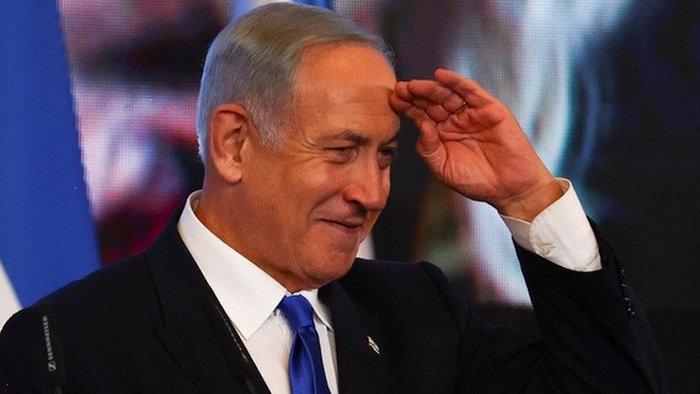Palestinian fears heightened as Israeli far right heads to power
- Published
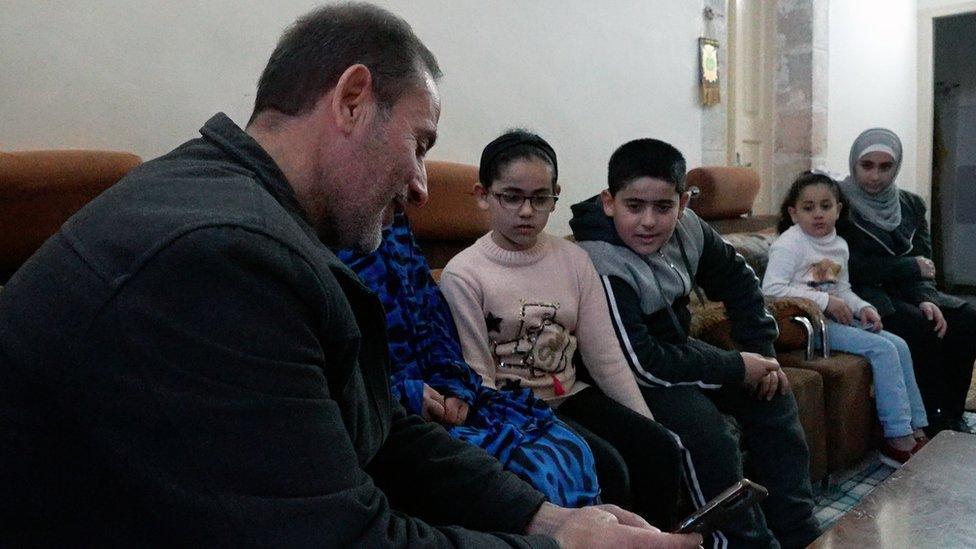
Yasser Abu Markhiya (L) and his family were being interviewed when Israeli settlers stormed into their garden
I came to talk to Yasser Abu Markhiya about the attacks on his home in Hebron but he ended up lying speechless in pain in his garden after getting kicked in the groin.
Our cameras had just started recording in their house when it began.
"Settlers with stones attacking! Settlers with stones!" shouts my producer.
We run outside with the Palestinian family as two young Israeli men storm into their garden, followed by soldiers.
One of the settlers heads straight towards us yelling at the family: "Get out of here, leave!"
Mr Abu Markhiya strides up to him, trying to face off the threat, filming on his phone as a soldier blocks him, but the Israeli man lunges forward and kicks the Palestinian homeowner.
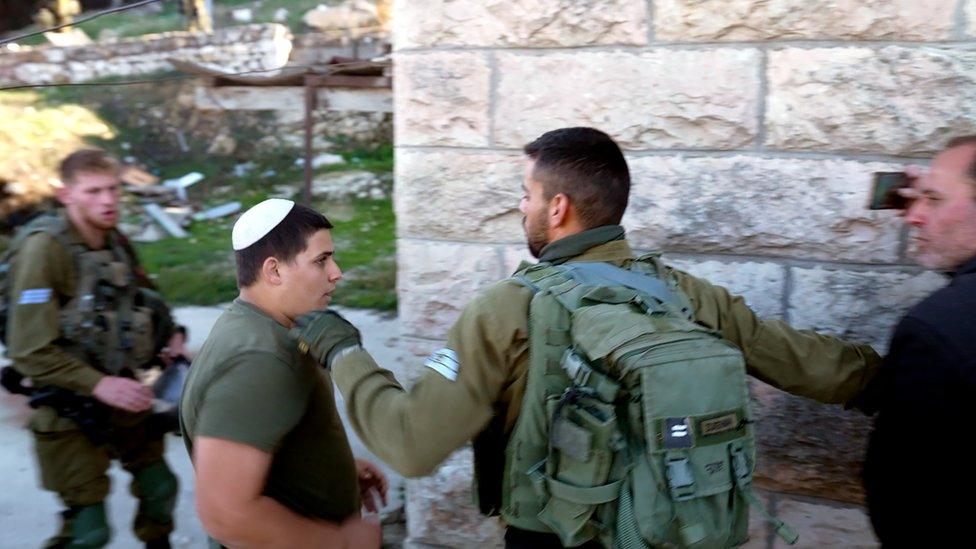
A young Israeli settler (2nd L) kicked Mr Abu Markhiya (R) as an Israeli soldier tried to intervene
The assault is a sudden illustration of what we came to interview the family about: Palestinians in Hebron say they feel increasingly vulnerable to attack after Israel's recent election.
The vote saw a massive rise in support for the far right, empowering an ultranationalist hardcore of the settler movement in Hebron and elsewhere, and reigniting a culture war within Israeli society over the role of the military in the occupied territories.
After Mr Abu Markhiya is kicked, there is a standoff as we keep filming.
A Palestinian activist helping the family, Badee Dwaik, shouts: "The soldiers do nothing to protect the Palestinians. If a Palestinian did that, you would take him to jail or shoot him!"
He is voicing a frequent complaint of systematic discrimination: That Israeli settlers who commit violence against Palestinians in the occupied West Bank rarely face accountability.
As if to prove the point, the man who kicked Mr Abu Markhiya walks towards his car, is given a handshake by one of the soldiers, and then he is gone.
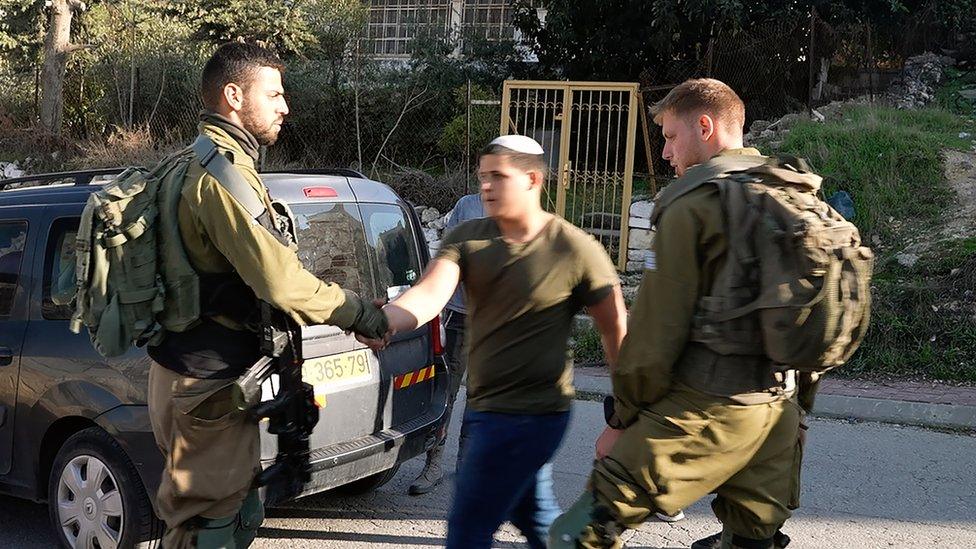
The settler who kicked Mr Abu Markhiya was let go by the soldiers with a handshake
Mr Abu Markhiya, meanwhile, is lying hurt as a neighbour tends to him.
Asked about the incident, the Israel Defense Forces (IDF) said soldiers are required to stop acts of violence against Palestinians and if necessary detain suspects until police arrive. The police routinely say they do investigate settler violence, but rights groups say these are usually a whitewash.
From fringes to mainstream
November's election saw the far-right Religious Zionism alliance win 14 seats in Israel's 120 seat parliament, set to make it the second most powerful force in Prime Minister-elect Benjamin Netanyahu's coalition.
Appointed to the newly expanded post of National Security minister, in charge of police in Israel and the occupied West Bank is Itamar Ben-Gvir - leader of the ultranationalist pro-settler Otzma Yehudit (Jewish Power) party, which espouses racist, anti-Arab policies.
He made his name among a young national-religious base as a gun-wielding street agitator who calls for the deportation of "disloyal" Arabs and for the shooting of Palestinians who throw stones.
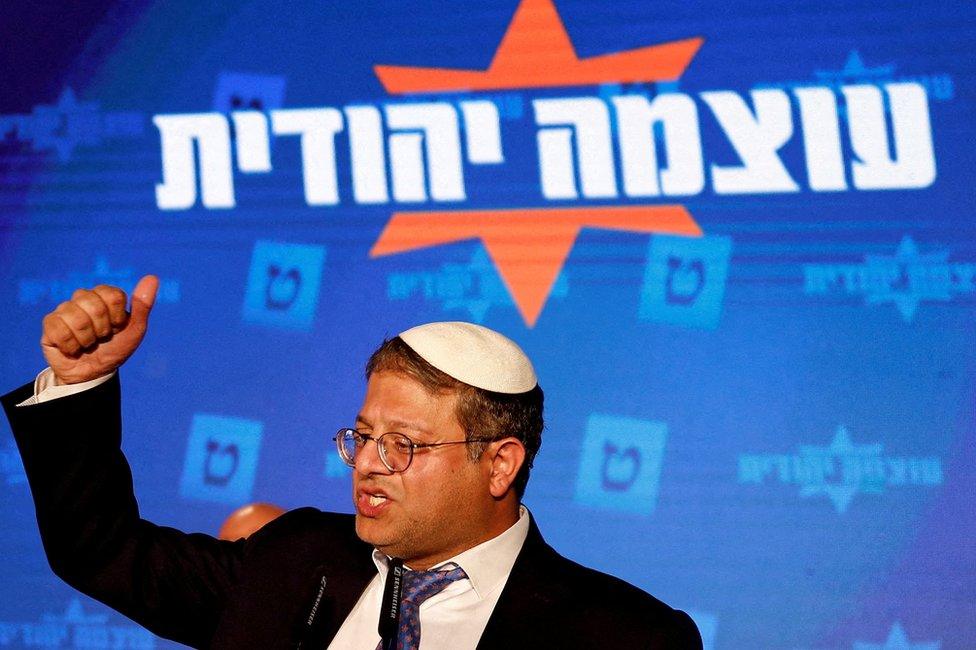
Itamar Ben-Gvir, who will be in charge of Israel's police force, was once convicted of anti-Arab racism
Mr Ben-Gvir has previous convictions for racist incitement and supporting a Jewish terrorist group, and is well known to the Palestinians of Hebron as he comes from one of the city's Jewish settlements.
Many fear his promotion from the radical fringes into the political mainstream will usher in a dangerous new phase, with the region already gripped by deadly IDF arrest raids in the West Bank and the most lethal wave of Palestinian attacks in years.
In Hebron this year, two Palestinians including a 16-year-old boy have been shot dead by Israeli forces during protests in the city, and a further two during alleged knife attacks on Israeli forces. One Israeli man was killed in a gun attack by a Palestinian who was subsequently shot dead.
On the day we filmed, Israeli peace activists were leading a tour meant to look at the daily realities of life here.
'Heart of the occupation'
Hebron is a city of checkpoints and a flashpoint of the conflict and occupation. At its core are several hundred Israeli settlers who have the protection of an army and full political rights, surrounded by hundreds of thousands of Palestinians who have neither.
Many consider it the occupation in its most concentrated form.
Streets in its historic centre are a dystopian mix of civilian homes and shops with doors welded shut amid militarised fences, walls and watchtowers - an area hollowed out of its once bustling Palestinian life, as only residents may enter. The Israeli army refers to these as "sterile" zones necessary for security.
Hebron is a political heartland for the Israeli far right: settlers here voted overwhelmingly for the alliance jointly led by Mr Ben-Gvir and Bezalel Smotrich, another ultranationalist figure due to be minister of finance and in charge of Israel's day-to-day running of the West Bank, governing the lives of the Palestinians there.
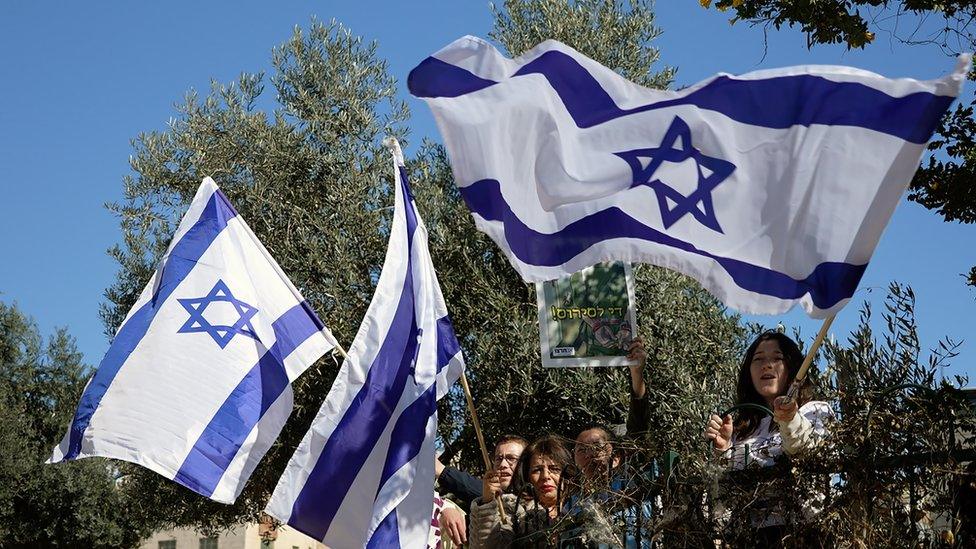
Settlers in Hebron voted overwhelmingly for Itamar Ben-Gvir's alliance in November's election
The Israeli peace activists have come to show solidarity with Palestinians after a fortnight of growing violence and intimidation. In the weeks after the election, during an annual Jewish pilgrimage, hundreds of young Israelis attacked homes. The following weekend, an IDF soldier beat a left-wing Israeli activist who came to support Palestinian residents, while another soldier was filmed praising Mr Ben-Gvir, saying the firebrand politician would "sort this place out."
The UN's envoy to the region Tor Wennesland condemned the violence, as did the outgoing Israeli defence minister Benny Gantz, who warned during the election that Mr Ben-Gvir threatens to set the country on fire.
Among those who had their homes attacked in the violence were Mr Abu Markhiya and his neighbour, Imad Abu Shamsiyyeh.
They have worked with the Palestinian group Human Rights Defenders over the years which has documented violence against Palestinians, something activists believe could put them at greater risk.
"They stood in this exact place and started throwing stones madly, cursing us with obscene words, and shouting racist slogans: 'Death to Arabs' and 'Get out of these houses that belong to Israel, we will take them back'," Mr Abu Shamsiyyeh tells me.
"I was very scared for myself, my wife and my children, as there were a large number of settlers. Especially now with Ben-Gvir in the government, who has come to my house more than once," he says.
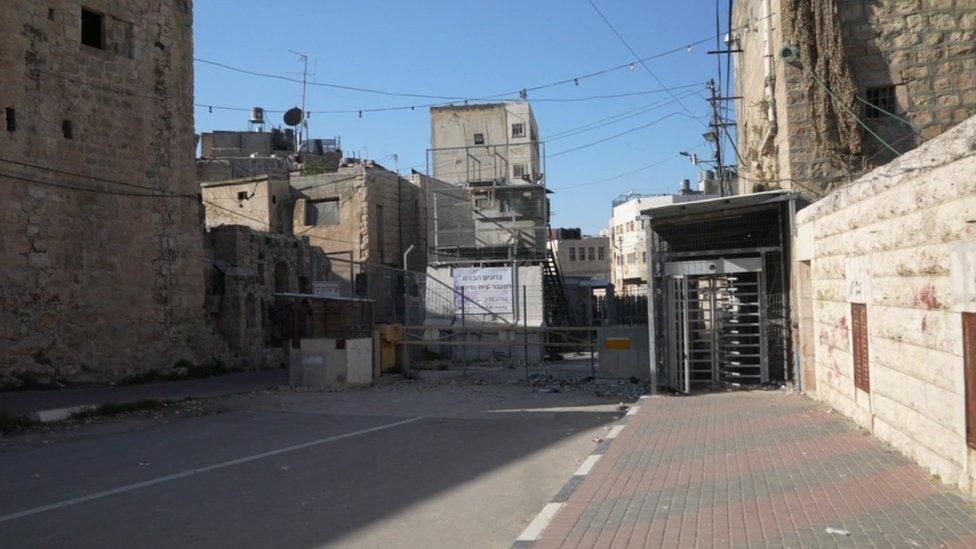
A closed-off street in Hebron with an Israeli military checkpoint and watchtower
Mr Abu Markhiya continues: "Since the Israeli elections, the attacks have increased and grown more fierce."
Later, the soldier who was recorded supporting Mr Ben-Gvir was jailed for several days. It fed into a heated row in Israel, with nationalists arguing the military leadership was bowing to liberal pressure to punish the country's defenders.
One of those making the case was Mr Ben-Gvir himself, suggesting the activists provoked or hit the soldiers - a claim for which there was no evidence.
'Now they have more energy'
An old fault-line in Israeli society was being aggravated in occupied Hebron: That between hawkish nationalists and what remains of the peace camp. I watched the tensions mount in the city, as settlers rallied against visiting anti-occupation activists.
Yishai Fleisher, a well-known voice of the settler right who describes himself as the international spokesman for the Jewish Community of Hebron, talks to me as his allies yell "traitors" at the arriving activists.
I ask him why they are shouting, aren't the visitors just trying to expose the discriminatory realities of the city?
"Their opinion has become a total minority in Israel," he says. "The jihadism that is in this town and the [Palestinian militant group] Hamas that rules this town, that is the real segregationist and apartheid-ist type of rule that can come into this place if Israel doesn't control it."
"In this plot of land which is a tiny plot of land, our tribal lands, we certainly should have control. It's our land," he adds.
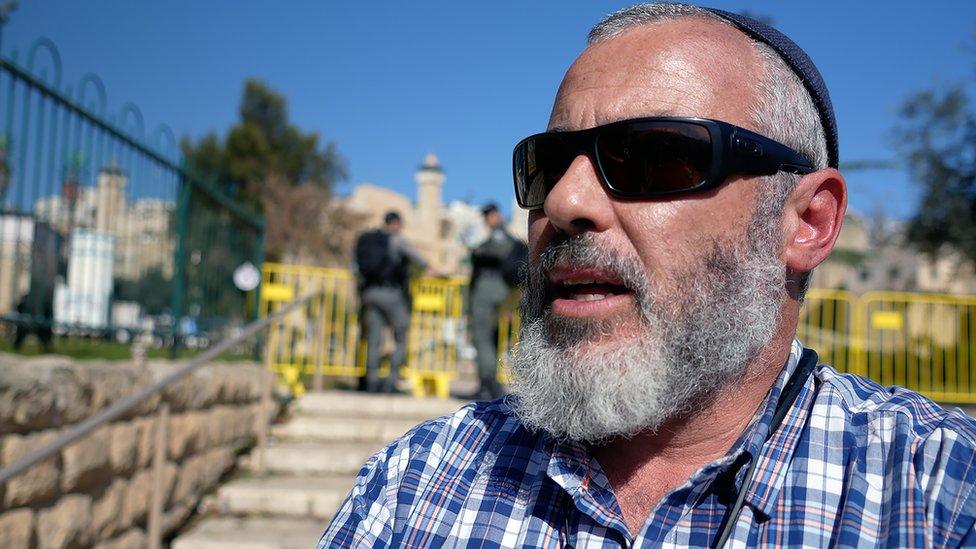
Yishai Fleisher says Israelis "want anti-jihadism, pro-family and pro-God"
I put it to him that it just sounds like racism - an assertion he rejects.
"We want our minorities to be successful and to be upwardly mobile. We have no problem with our minorities as long as they're law-abiding and non-jihadist," he says.
In the occupied West Bank there are around three million Palestinians. Around 500,000 Israelis live in settlements, all of which are considered illegal under international law - something disputed by Israel.
We leave the right-wing rally and are told by soldiers we cannot come back if we go to the peace camp activists.
We head over. Among the crowd is Tal Sagi from the group Breaking the Silence, made up of former soldiers who oppose the occupation and who try to expose its daily humiliations for Palestinians.
She was conscripted as a soldier in Hebron, where she describes an interdependent relationship between the IDF and the settlers. The message from the latter, she says, is that Palestinians are "all enemies".
"I know what it's like to be here as a soldier. You are in such close connection with the settlers the whole time and they give you food and they talk to you and... you hear these messages all the time," she explains.
"I also grew up also as a settler, so something that I heard from a very young age [was]... that everyone wanted to kill me and that every Palestinian is a threat."
"Now, after Ben-Gvir's victory, [the settlers] have even more energy and they are here with a lot of confidence and they know they have a lot of power with them in the government. So they feel very confident to say all those things and act like that," she adds.
As we talk the army stops the crowd moving - they have declared a closed military zone, say the activists. Eventually one of the Palestinians they were due to visit comes to them.
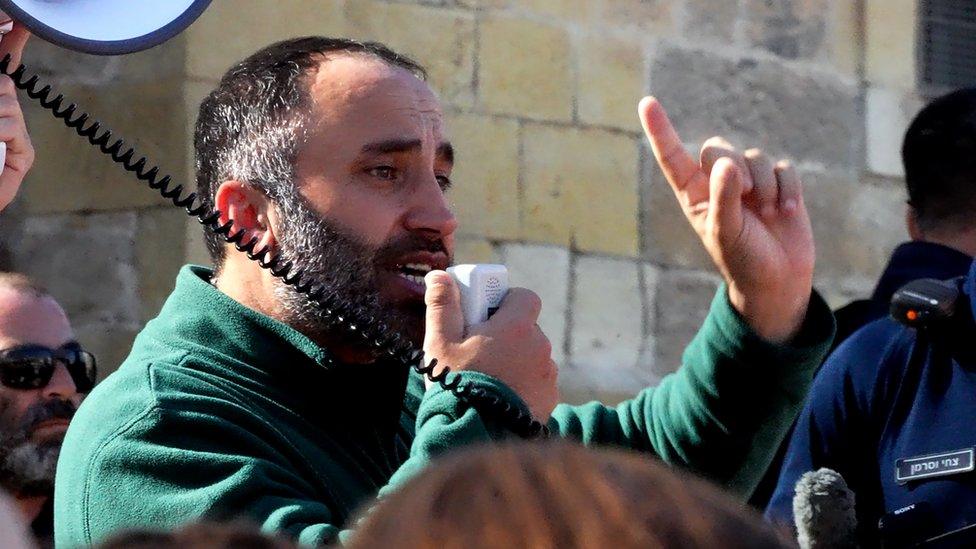
Issa Amro addressed a gathering of Israeli peace activists touring Hebron before being arrested
Issa Amro is a well-known activist and founder of Youth Against Settlements, which leads tours of Hebron. He is a vocal critic of both the Israeli forces and the Palestinian Authority, and has been arrested by both.
He has been declared a human rights defender by the EU and the UN, both of whom have previously condemned his repeated arrests.
After his speech to the Israeli peace camp, Mr Amro tries to show me how he is unable to go to his own home due to his latest arrest conditions.
But as we film, he is pulled away from us. Four undercover Israeli police, including the officer we spotted earlier, put him up against a wall and search him. He is told he is being detained for "obstructing justice".
Like the Israeli activists and the Palestinian family attacked as we filmed, he believes the authorities simply do the bidding of the city's settler movement - now feeling more emboldened than ever after the election. But he cannot explain further as he is taken away, silenced for a few more hours again.
- Published28 November 2022
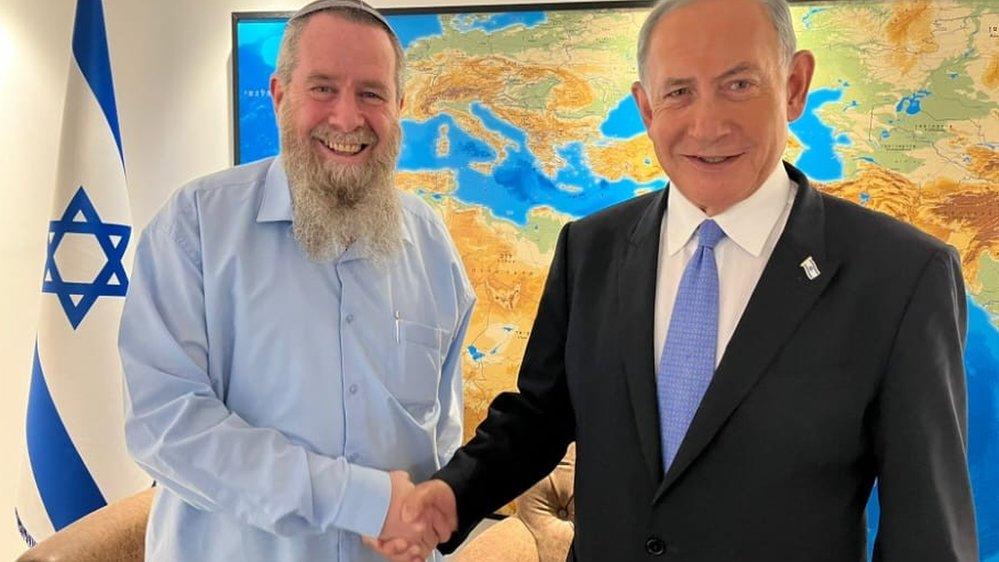
- Published25 November 2022
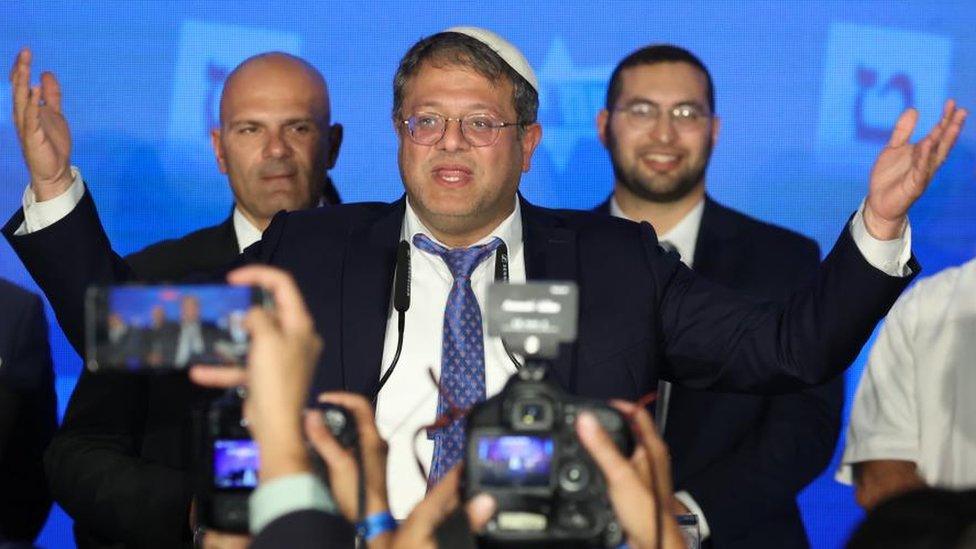
- Published17 November 2022
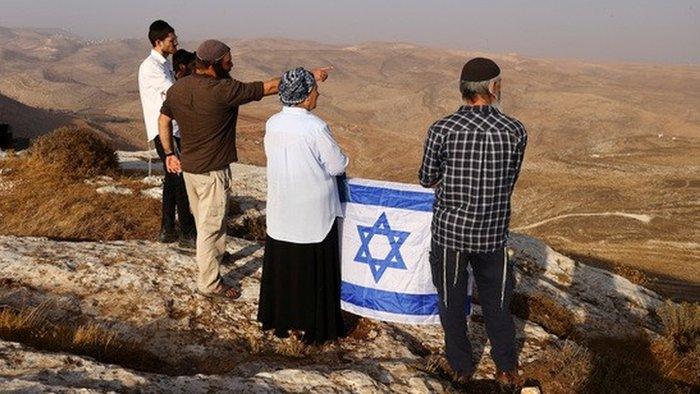
- Published21 November 2024
